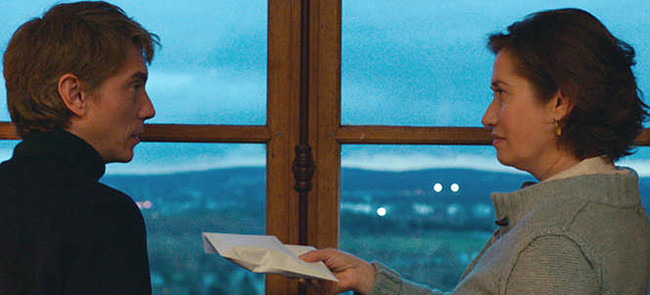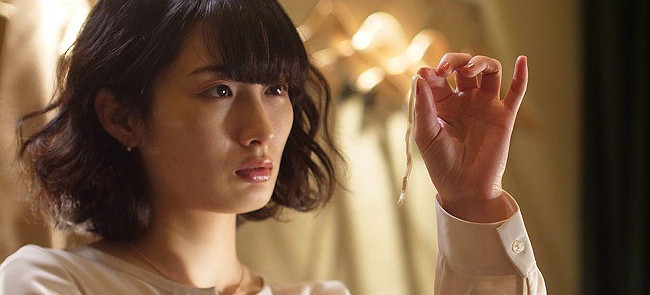| SHADOWS ON THE WALL | REVIEWS | NEWS | FESTIVAL | AWARDS | Q&A | ABOUT | TALKBACK | |||||||||||||||||||||
 Shadows off the beaten path Shadows off the beaten pathIndies, foreign, docs and shorts...
On this page:
ANAIS IN LOVE |
I WANT TO TALK ABOUT DURAS |
SEXUAL DRIVE
| |||||||||||||||||||||
| See also: SHADOWS FILM FESTIVAL | Last update 19.Apr.22 | |||||||||||||||||||||
|
Anaïs in Love Les Amours d’Anaïs Review by Rich Cline | 
| |||||||||||||||||||||
 dir-scr Charline Bourgeois-Tacquet prd David Thion, Stephane Demoustier, Philippe Martin, Igor Auzepy with Anais Demoustier, Valeria Bruni Tedeschi, Denis Podalydes, Jean-Charles Clichet, Xavier Guelfi, Christophe Montenez, Anne Canovas, Bruno Todeschini, Annie Mercier, Gregoire Oestermann, Marie-Armelle Deguy, Sabrina Delarue release Fr 15.Sep.21, US 29.Apr.22 21/France 1h38 CANNES FILM FEST Is it streaming? |
 Snappy and sunny, this French comedy-drama is an involving mixture of abrasively funny characters and more serious subplots. So while the narrative plays out with often farcical touches, writer-director Charline Bourgeois-Tacquet and the terrific cast are able to dig beneath the surfaces to make sometimes nutty situations easy to identify with. What emerges is an offbeat coming-of-age tale about two grown women who still need to find themselves. At 30, Anais (Demoustier) is happily breezing through life in a state of chaos, increasingly in debt. In her mind, the only problem is that she isn't in love with her boyfriend Raoul (Montenez). At a party she meets Daniel (Podalydes), an older man who falls for her free spirit. They start an affair, but Daniel isn't single. Anais then becomes fascinated by photos of his partner Emilie (Tedeschi), watching her videos and reading her books, then tracking her down and introducing herself. Surprisingly, they have a lot in common, including a mutual attraction. Anais is a nonstop chatterbox who is oblivious to how annoying her irresponsible thoughtlessness can be to everyone she encounters. So when we meet her oddball parents (Canovas and Todeschini) and her hilarious brother (Guelfi), we begin to see where she gets it. Their interaction with Anais is far more nuanced than her conversations with anyone else, because her dialog is essentially a continuous monologue. Then with Emilie, she finds someone who provokes and challenges her, and also truly sees her. Demoustier is remarkably charming for someone who is so selfish and impulsive. So her moments of private emotion have a strong impact. She gets through an astonishing amount of dialog over the course of this film. And she only quiets down in the presence of the superb Tedeschi, who skilfully crafts Emilie as a more grounded version of the same life-loving personality. Meanwhile, the supporting characters are also sharply well-played as people with their own all-consuming obsessions. "I don't want to meet interesting people," Anais says. "I want to be interesting." Yes, her spiralling stream of consciousness is definitely interesting, although it gets much more engaging in her interaction with Emilie, someone she may even be able to actually relax and simply be herself around. Both women are on their own journeys of self-discovery, and the question is whether they can tell true love from the illusion of it. Perhaps heartbreak is an essential experience, but let's put that off for another day at least.
| ||||||||||||||||||||
|
I Want to Talk About Duras Vous ne Désirez que Moi Review by Rich Cline | 
 Is it streaming?
|  With a script taken verbatim from a 1982 interview, this French drama offers a complex exploration of celebrity. It's also a riveting, disturbing firsthand account of a relationship with an artistic legend. Writer-director Claire Simon clearly relishes the contradictions in the story, which grapples with uneven connections between people who find themselves in a non-traditional romance. So while the film is talky and prickly, it's also thoughtful and provocative. Two years into his 16-year relationship with writer-filmmaker Marguerite Duras, Yann Andrea (Arlaud) asks his friend, journalist Michele Manceaux (Devos), to interview him on tape, giving himself the voice he's losing in his relationship. He recounts writing to Duras as a young fan, then meeting her when she replies to his letters six years later. At 27, he falls under this 65-year-old icon's spell, losing his identity within her forceful orbit. He may be gay, but he's powerless in the presence of a woman who controls everything from his his perfume to his sex life. In the cerebral, philosophical interview, Yann speaks about being dazzled by Duras long before their tumultuous mutual passion. Shot in unbroken takes with a remarkable fluidity, this conversation occasionally cuts away to flickering flashbacks that reveal earthy impressions rather than details. There are also terrific archival clips of the real Duras, with interview snippets and an amazing scene in which she directs Yann on her film set in a way that's demanding and dismissive. And their romantic relationship is depicted with erotic watercolours. Recounting the story in a way that's open and thoughtful, Arlaud beautifully conveys the contradictions in this relationship. Yann is gay but gives into his idol, indulging in the fiction of their connection, enticed by Duras' overt sexuality and accepting her dominance. This later makes him feel guilty about betraying her simply by having his own thoughts. Opposite him, Devos reacts with subtlety, then in an interlude silently stops the tape and goes home to her husband (Paou), offering a glimpse of her own private life. Intriguingly, the original title translates as "You Only Want Me". Filmmaker Simon is exploring the complexities of sexuality, such as how passion can trump gender. As intriguing is the way the film takes on the idea that the human human mind can create and even endure a fiction about itself. Duras completely transformed Andrea, controlling his clothing, friends, job and even his desires. "I don't exist," he admitted. And the film quietly reveals that, even though he was complicit in this, his deeper identity couldn't be suppressed forever.
|
| Sexual Drive Review by Rich Cline | 
|  dir-scr Kota Yoshida prd Tsuyoshi Goto with Tateto Serizawa, Ryo Ikeda, Manami Hashimoto, Hona Ikoka, Mukau Nakamura, Shogen, Rina Takeda, Yuji Iwaoka, Shizuko Kawakami, Takashi Nishina, Hagiwara, Yukihiro Haruzono release US 22.Apr.22, Jpn 29.Apr.22 21/Japan 1h10 Is it streaming?
|  In three loosely interlinked stories, Japanese writer-director Kota Yoshida taunts a series of characters with their secret desires. The chapters are playfully named after food and are connected by an impish character whose lusty provocations cause a variety of telling reactions. With its bonkers sensibility, the film is bright and often wickedly funny, cleverly exploring the shifting power of attraction. And it's packed with profound observations that linger. In Natto, young Enatsu (Ikeda) has a visit from Kurita (Serizawa), an older man partially disabled from a stroke. He apologises his affair with Enatsu's wife Masumi (Hashimoto), then gleefully shares salacious details that leave Enatsu deeply shaken. In Mapo Tofu, the nervous Akane (Ikoka) hits Kurita with her car. Panic-stricken, she drives him home. On the way, he criticises her bland version of a spicy Chinese dish, then claims she's hiding her true nature. And in Ramen With Extra Back Fat, the married Ikeyama (Shogen) is instructed on his phone by Kurita to secretly follow his mistress Momoka (Takeda) to a greasy noodle bar. With a mischievous face, Kurita is clearly someone who cannot be trusted, but whether his tales are true is beside the point. This is about the reactions he elicits with his words, which create vivid pictures in the imaginations of his targets (and us too). Writhing in torment, they beg him to stop talking. Each encounter floods the senses, as Kurita elaborately describes how taste and smell can drive people crazy with desire. Yoshida's writing and direction bring these elements together very cleverly. Serizawa is terrific as Kurita, soft-spoken and insidiously menacing as he takes delight in pushing people over the brink. So his targets earn sympathy: Ikeda bristles with energy as the nervous husband, Ikoka plays Akane as a woman crippled by fear, and Shogen is viscerally intense as a man blackmailed into facing up to his adultery. Each of them snap during their encounter with this mysterious devil, emerging visibly changed by their interaction with him. Yoshida directs scenes with jagged wit, twisting the perspective as Kurita takes control of each situation by evoking a range of sensualities. Tiny details are caught on camera to augment Kurita's suggestive conversation. There's a possibility that he only exists in their guilty consciences (a running gag involves chestnuts, or "kuri"), as if he's an internal trigger helping these people deal with issues they've long repressed. In the final chapter specifically, the film takes on the intersection between love and lust with powerful insight.
| 
See also: SHADOWS FILM FESTIVAL © 2022 by Rich Cline, Shadows
on the Wall
HOME | REVIEWS | NEWS | FESTIVAL | AWARDS
| Q&A | ABOUT | TALKBACK | | ||||||||||||||

